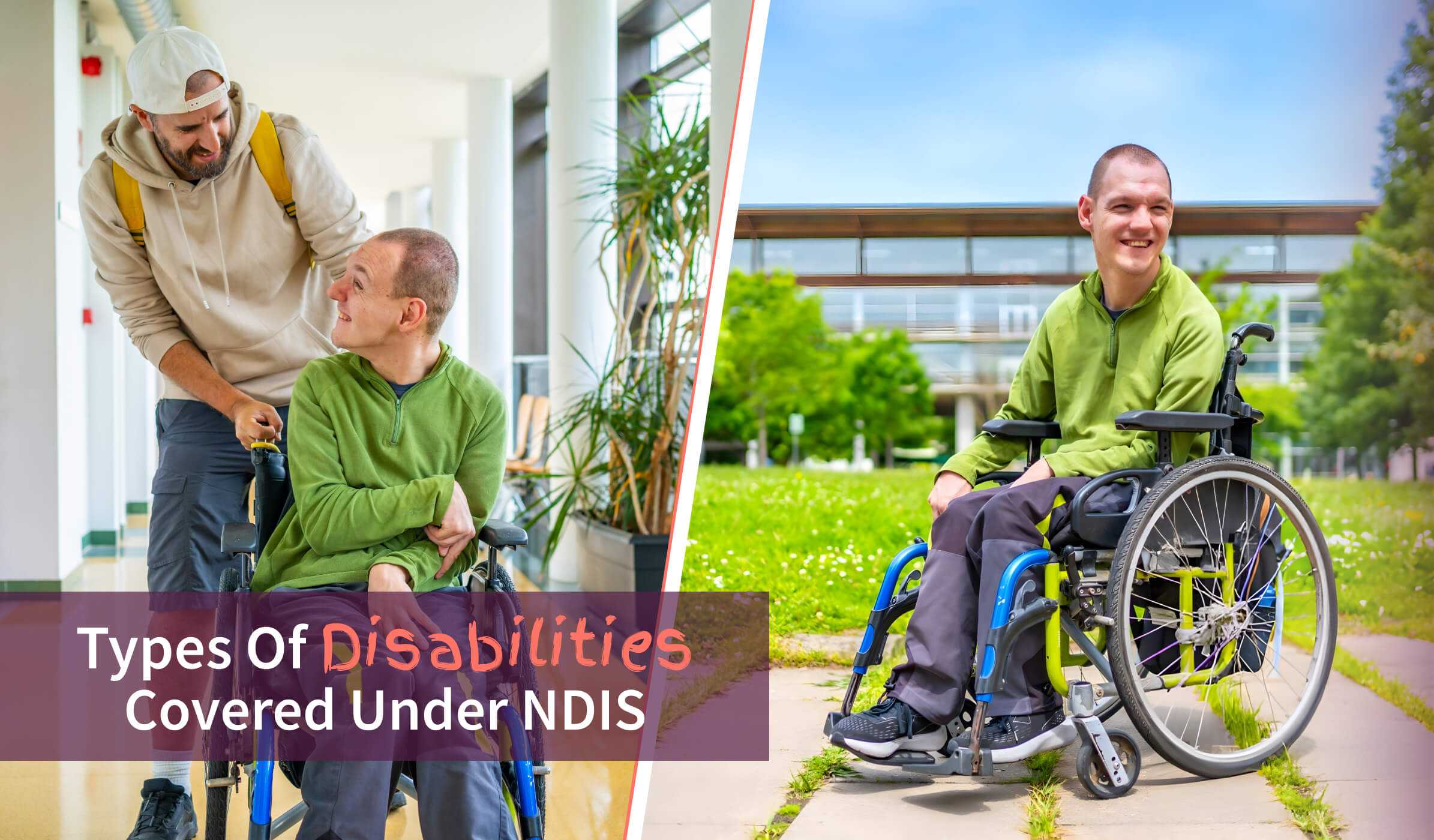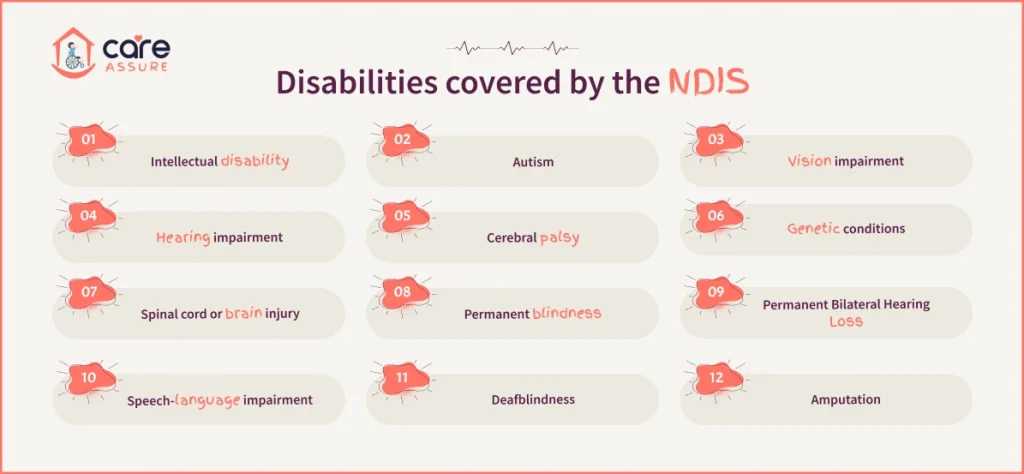Types Of Disabilities Covered Under NDIS
July 31, 2024
|By Careassure
|11 min read

Disabilities can be hard to understand, but the National Disability Insurance Scheme (NDIS) clarifies which types of disabilities are covered. This is very important for people who need help. The NDIS is an effort of the Australian government to help people with long-term and severe disabilities by giving them support and services. The goal of this plan is not only to make people with disabilities' lives better but also to give them more power to be a full part of society.
This blog post will discuss the different kinds of disabilities that the NDIS covers, explain who is eligible, and explain what help is available for each group. The NDIS helps people with a wide range of needs, such as those caused by brain and physical disabilities, sensory impairments, and psychosocial conditions. If people and their families know about these groups, they can better use the NDIS system and get the help they need to live full, independent lives.
Disabilities Covered by the NDIS
Here are the main disabilities covered by the NDIS below

Intellectual disability
Intellectual disability causes considerable restrictions in cognitive functioning and adaptive behaviour, affecting conceptual, social, and practical skills. The NDIS offers personalised support plans for people with intellectual impairments, emphasising personal growth, education, job, and community participation. These supports are intended to improve the individual's independence and quality of life.Autism
Autism Spectrum Disorder (ASD) is a neurodevelopmental disorder that affects communication, social interaction, and behaviour. The NDIS helps people with autism by providing early intervention programmes, treatments, and assistance with daily activities. These services aim to improve communication skills, social relationships, and overall functioning, allowing people to live more independently.Vision impairment
Vision impairment means that one or more of the eye's or visual system's processes aren't working as well as they should. This can be anything from barely being able to see to being completely blind. Prescription glasses or surgery can't fix it, so you can see normally again. Some people have vision problems that were present from birth, while others have an eye condition that gets worse over time and can cause blindness, or they have vision problems after an accident or brain injury. People who have trouble seeing may still have some useful vision. This is called functional or leftover vision. Notably, the loss is significant enough to make it hard to do work-related, leisure, or social activities.Hearing impairment
When one or more parts of the ears, the nerves that come from the ears, or the part of the brain that affects hearing go wrong, this is called hearing loss. Hearing impairment, hearing loss, or deafness means inability to hear sounds or words. Anyone of any age can have impairments that range from mild to serious. Different kinds of hearing loss last for different amounts of time. Hearing problems present at birth are called "congenital," while hearing problems that are "acquired" happen throughout a person's life.Cerebral palsy
Cerebral palsy is a collection of problems that impair a person's ability to move, balance, and maintain posture. The NDIS covers physiotherapy, occupational therapy, speech therapy, and assistive technology for cerebral palsy. These aids help people manage their physical symptoms, increase their mobility, and improve their capacity to complete daily tasks.Genetic conditions
DNA abnormalities cause genetic diseases like Down syndrome and Fragile X syndrome. The NDIS provides extensive support for people with genetic diseases, including medical care, therapy services, and educational and employment help. The goal is to provide comprehensive care that addresses the physical and developmental elements of the illness.Spinal cord or brain injury
Spinal cord and brain injuries can cause considerable physical and cognitive damage. The NDIS, which includes rehabilitation programmes, personal care help, and specialised equipment, can provide considerable support to individuals with severe injuries. These supports maximise recovery, improve mobility, and promote a return to everyday activities.Permanent blindness
Permanent blindness greatly limits a person's ability to conduct daily duties independently. The NDIS supports individuals with permanent blindness by providing orientation and mobility training, assistive technology, and vision rehabilitation services. These services assist persons in adapting to their condition, increasing their independence, and improving their quality of life.Permanent Bilateral Hearing Loss
Permanent bilateral hearing loss causes substantial hearing impairment in both ears. The NDIS provides various supports for individuals with hearing loss, including hearing devices, communication training, and speech therapy. These programmes aim to develop communication skills and allow people to participate more fully in social and professional activities.Speech-language impairment
Someone with speech or language trouble might be unable to talk to others like they do. They might have trouble with the sounds of their speech or learning and using language. Some people may also talk to each other differently.Autism Spectrum Disorder, Intellectual Disability, Down syndrome, Hearing Impairment, and Acquired Brain Injury are just a few of the conditions or disorders that children may be born with that affect their speech, language, and communication skills. Speech Language Disorders can also happen on their own. This kind of trouble can last a short or a long time and can be mild to serious.
A lot of people may have trouble speaking and understanding words later in life. Speech and language problems can come on slowly in people, or they can come on quickly, like after a stroke. Disorders can make it hard to speak or understand language, make it hard to make certain sounds or words (like slurring) or change the speed or flow of speech. Having trouble eating is another sign of a disorder.
Deafblindness
Deafblindness is a dual sensory impairment that affects vision and hearing, causing major communication and movement issues. The NDIS offers specialised help for deafblindness, such as assistive equipment, communication aids, and specific rehabilitation programmes. These aids are intended to increase the individual's capacity to interact with their environment and overall quality of life.Amputation
Amputation is the loss of a limb or a portion of a limb that considerably impairs mobility and daily life. The NDIS provides prostheses, physical therapy, and rehabilitation services to people who have had their limbs amputated. These supports assist persons in adapting to their condition, regaining mobility, and living active, independent lives.What Kinds Of Disabilities Does The NDIS Not Cover?
The National Disability Insurance Scheme does not cover disabilities that only last a certain amount of time or do not last a lifetime. Such as if you have an accident or an injury like a lower limb fracture that makes it hard for you to move around. It's too bad that this won't meet the NDIS disability standards because this injury is likely to get better over time and isn't seen as a permanent and major disability.
In addition to the above, the NDIS will not pay for or help with long-term health problems that are not connected to a person's handicap. For instance, the NDIS may pay for disability support for someone who had to have a lower limb amputated because of peripheral artery disease in the context of diabetes (physical impairment resulting in disability secondary to a health condition) as long as they can meet all the access requirements.
As mentioned above, it is important to remember that the NDIS will not pay for the medicine or medical care needed to treat diabetes or peripheral artery disease, such as visits to the GP or appointments with experts or doctors. This is where Medicare would come in handy. The NDIS does not cover all types of disabilities or support. Those will not be paid for or given by the NDIS.
The NDIS can't pay for help that is:
- The job of another part of the government or community service;
![icon]()
- The job of another part of the government or community service;
![icon]()
- For day-to-day living costs that have nothing to do with a participant's help needs or
![icon]()
- is likely to hurt the person or put other people in danger
![icon]()
The National Disability Insurance Scheme will not pay for things unrelated to the handicap.
In addition to the disabilities that the NDIS does not cover, it is also important to know that the NDIS does not cover all types of support. These include day-to-day costs like rent, bills, food, entertainment, and direct school or study costs like general fees, books, and stationery that all students need.
Conclusion
Navigating the NDIS and comprehending the various sorts of disability it addresses can be difficult. However, the NDIS is intended to provide comprehensive support for a wide range of diseases, including intellectual and developmental disabilities, physical impairments, and sensory loss. By providing individualised plans and a wide range of services, the NDIS aims to improve the quality of life and independence of people with disabilities.
Starting your NDIS journey can be intimidating, but you don't have to do it alone. Care Assure is here to help. Our skilled professionals can help you navigate the application process, understand your entitlements, and ensure you receive the required assistance. Whether you're just getting started or want to evaluate your current plan, Care Assure is devoted to providing the support and tools you need to make your NDIS experience as simple and helpful as possible. Contact Care Assure immediately, and we'll help you start your NDIS adventure. We can work together to achieve a better, more independent future.
Frequently Asked Questions (FAQs)
The National Disability Insurance Scheme (NDIS) is an Australian government initiative to provide comprehensive support to individuals with permanent and significant disabilities. This program aims to enhance the quality of life for people with disabilities by offering the necessary resources and services to help them achieve their goals and participate fully in the community.





